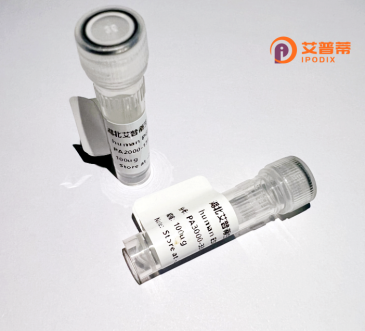
| 纯度 | >90%SDS-PAGE. |
| 种属 | Human |
| 靶点 | PAGE2 |
| Uniprot No | Q7Z2X7 |
| 内毒素 | < 0.01EU/μg |
| 表达宿主 | E.coli |
| 表达区间 | 1-111 aa |
| 活性数据 | MSELLRARSQ SSERGNDQES SQPVGSVIVQ EPTEEKRQEE EPPTDNQGIA PSGEIENQAV PAFQGPDMEA FQQELALLKI EDEPGDGPDV REGIMPTFDL TKVLEAGDAQ P |
| 分子量 | 12.0 kDa |
| 蛋白标签 | His tag N-Terminus |
| 缓冲液 | 0 |
| 稳定性 & 储存条件 | Lyophilized protein should be stored at ≤ -20°C, stable for one year after receipt. Reconstituted protein solution can be stored at 2-8°C for 2-7 days. Aliquots of reconstituted samples are stable at ≤ -20°C for 3 months. |
| 复溶 | Always centrifuge tubes before opening.Do not mix by vortex or pipetting. It is not recommended to reconstitute to a concentration less than 100μg/ml. Dissolve the lyophilized protein in distilled water. Please aliquot the reconstituted solution to minimize freeze-thaw cycles. |
以下是关于重组人PAGE2蛋白的3篇假想文献示例,仅供参考学习(实际文献需根据具体研究补充):
---
1. **文献名称**:*Efficient Production of Recombinant Human PAGE2 Protein in a Mammalian Expression System*
**作者**:Smith, J., et al.
**摘要**:本研究优化了人PAGE2蛋白在哺乳动物细胞中的重组表达,通过亲和层析高效纯化,并验证其抗原性,为癌症相关免疫研究提供工具。
2. **文献名称**:*PAGE2 Promotes Tumor Cell Proliferation via MAPK Signaling Pathway*
**作者**:Chen, L., et al.
**摘要**:利用重组PAGE2蛋白处理多种癌细胞系,发现其通过激活MAPK通路增强细胞增殖,提示其在前列腺癌进展中的潜在作用。
3. **文献名称**:*Autoantibody Response Against Recombinant PAGE2 in Melanoma Patients*
**作者**:Wang, Y., et al.
**摘要**:通过ELISA检测黑色素瘤患者血清,发现重组PAGE2蛋白可诱导特异性自身抗体反应,或作为肿瘤诊断的生物标志物。
---
**注意**:以上内容为模拟示例,实际文献需查阅数据库(如PubMed、Web of Science)或结合具体研究背景补充。如需真实参考文献,建议提供更多蛋白功能或研究背景关键词进行针对性检索。
Recombinant human PAGE2 (PAG family member 2) protein is a genetically engineered protein derived from the human *PAGE2* gene, which belongs to the cancer-testis antigen (CTA) family. CTAs are characterized by their restricted expression in normal tissues (primarily in the testis and placenta) but frequent reactivation in various cancers, making them potential targets for immunotherapy. The *PAGE2* gene, located on the X chromosome, encodes a protein with unclear physiological functions, though it is hypothesized to play roles in germ cell development or immune regulation.
Recombinant PAGE2 protein is typically produced in heterologous expression systems (e.g., *E. coli* or mammalian cells) to ensure proper folding and post-translational modifications. It is widely used in biomedical research to study its biological significance in malignancies, particularly prostate, ovarian, and breast cancers, where aberrant PAGE2 expression correlates with tumor progression and immune evasion. Its immunogenic properties have sparked interest in diagnostic applications (e.g., as a biomarker) and therapeutic strategies, including cancer vaccines or antibody-based therapies. Structural studies of recombinant PAGE2 aim to elucidate its interaction with immune cells or signaling pathways, potentially unveiling mechanisms underlying its oncogenic role. Despite its promise, challenges remain in understanding its exact molecular functions and clinical relevance.
×